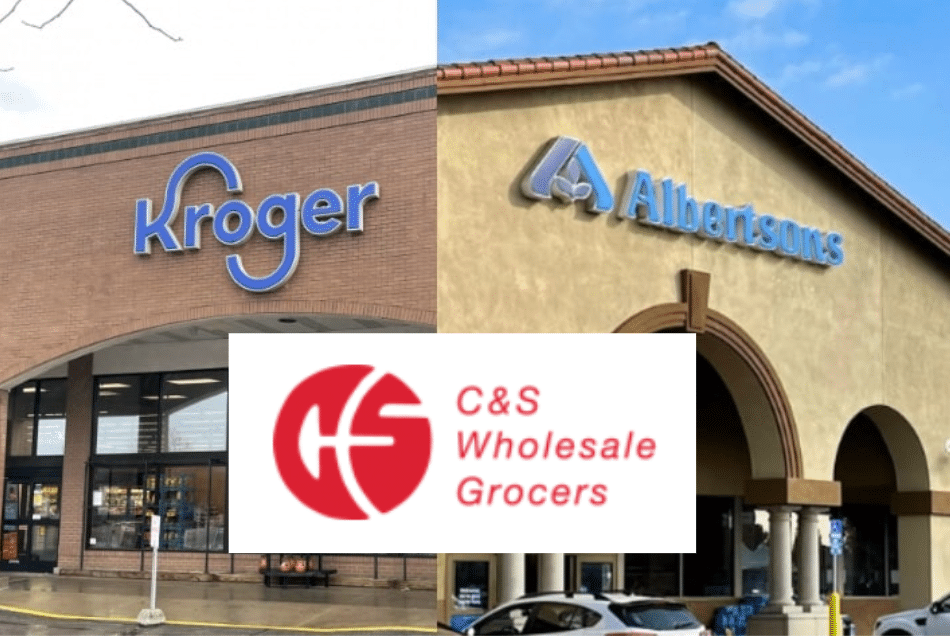
Have you ever known a couple who went through a bad breakup, and despite your desire to see them move on, you instead have to hear their gripes about who was to blame for the relationship gone bad?
That’s kind of where things are at the moment between Kroger and Albertsons, three months after their proposed merger fell through. Each side is blaming the other in court, with a third wheel also getting its own digs in.
In response to Albertsons’ December lawsuit against its former partner, Kroger filed a countersuit this week, accusing Albertsons of double-dealing during the regulatory review process. Albertsons had claimed it was owed a $600 million termination fee, plus billions more in damages, after two adverse court rulings prompted it to call off the deal. Kroger’s new court filing says Albertsons is owed nothing, and Kroger is instead seeking damages of its own from Albertsons, for allegedly “surreptitiously working to undermine” the merger and ensure its failure.
“While Kroger was working diligently to seek regulatory approval and close the merger, Albertsons was engaging in a secret and misguided campaign, together with C&S Wholesale Grocers, the divestiture buyer, to pursue its own regulatory strategy, which ultimately undermined Kroger’s efforts,” Kroger has claimed.
That campaign allegedly involved “secret communications,” via “personal emails and cell phones,” between executives of Albertsons and C&S, which was set to obtain hundreds of stores from Kroger and Albertsons to help alleviate anticompetitive concerns. Instead, Kroger says, C&S publicly criticized the very set of stores it had agreed to obtain, which prompted regulators to question the divestiture plan as well.
Kroger also accuses Albertsons of developing a “Plan B,” to turn on Kroger if the deal failed to close. While Kroger says it was determined to “pursue all remaining options to close the merger” should regulators disapprove, Albertsons gave up immediately, not only terminating the merger but filing its lawsuit against Kroger within hours of the court decisions against the deal. This could only have been done, Kroger points out, if Albertsons had been planning a lawsuit against Kroger all along, which ran counter to its “contractual obligation to use best efforts to close the transaction.”
Albertsons’ lawsuit blamed Kroger for dooming the deal, saying its would-be merger partner “refused to offer an adequate divestiture package and repeatedly ignored regulators’ concerns.” Kroger “derailed the merger after suffering a classic case of buyer’s remorse,” Albertsons’ lawsuit claimed, saying Kroger ultimately decided “it would go through with the deal, if at all, only on terms far more advantageous to Kroger than those for which it had bargained.”
C&S itself recently joined the blame game, filing its own lawsuit against Kroger, claiming Kroger also owes it a termination fee, to the tune of $125 million.
Both retailers have tried to exude positive vibes since the failed merger, suggesting they’re doing just fine on their own. Kroger says it’s making “significant investments that are delivering lower prices and increasing wages, while further improving the experience for an expanding customer base.” And Albertsons’ Chief Financial Officer recently assured investors that “we are a stronger company today than pre-merger, and the initiatives that have driven these results affirm our confidence in our future.”
But both retailers have also cut jobs and announced the departures of their longtime CEOs. So not everything post-merger is as rosy as they might suggest.
As for the merger that wasn’t, it was the courts that ultimately put an end to the whole idea. And as these partners-turned-litigants trade accusations, it will now be up to the courts to decide who deserves the blame.
Image sources: Kroger/Albertsons










